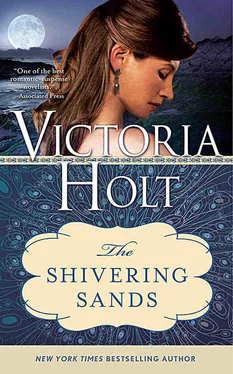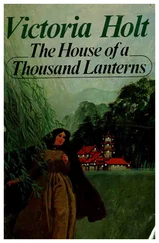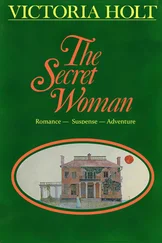“And Lady Stacy?”
“She died quite a long time ago…before Mrs. Lincroft came back as housekeeper.”
“And there is another young lady whom I am to teach.”
Mrs. Rendall smirked. “Edith Cowan…or rather Edith Stacy now. I must say it is all very odd. A married woman…poor thing.”
“Because she is married?” I prompted.
“Married!” snorted Mrs. Rendall. “I must say that was a very odd arrangement. I said so to the vicar and I shall continue to say so. Of course it is clear to me why Sir William arranged it.”
“Sir William?” I put in. “Didn’t the young couple have anything to say about it?”
“My dear young lady, when you have been at Lovat Stacy for a day you will learn that there is only one person who has any say in affairs there and that is Sir William. Sir William took Edith in and made her his ward and then he decided to bring Napier back and marry them off.” She lowered her voice. “Of course,” she excused her indiscretion, “you will soon be one of the household so you will discover these things sooner or later. It was only the Cowan money which could have induced Sir William to have Napier back.”
“Oh?” I was prompting her to go on but I think she realized she had been a little too communicative and she sat back in her seat, her lips pursed, her hands clasped in her lap, looking like an avenging goddess.
The train rocked in silence while I was trying to think of an opening gambit which would lure the loquacious woman to further indiscretions when Sylvia said timidly: “We are almost there, Mamma.”
“So we are,” cried Mrs. Rendall, getting to her feet and scattering parcels. “Oh dear, I wonder if this wool is the right ply for the vicar’s socks.”
“I am sure it is, Mamma. You chose it.”
I studied the girl sharply. Was that a little irony? However Mamma did not appear to have noticed. “Here,” she said to the girl, “take this.”
I too had risen and took down my bags from the rack. I was aware of Mrs. Rendall’s eyes on them, assessing them as she had assessed me.
“I daresay you’ll be met,” she said and gave Sylvia a little push after which she followed her daughter onto the platform and turning to me continued: “Ah yes, there is Mrs. Lincroft.” She called in her somewhat shrill and penetrating voice: “Mrs. Lincroft. Here is the young person you are looking for.”
I had alighted and stood with my two large bags beside me. The vicar’s wife gave me a brief nod and another to the approaching woman and went off with Sylvia at her heels.
“You are Mrs. Verlaine?” She was a tall, slender woman in her mid-thirties, I guessed. There was an air of faded beauty about her and I was immediately reminded of the flowers I used to press among the pages of books. A large straw hat was tied under her chin with light colored veiling; her large eyes were a faded blue; her face a little gaunt for she was very slender. She was dressed in gray but her blouse was a cornflower blue, which I suspected gave a deeper blue to her eyes. There was certainly nothing formidable about her.
I told her who I was.
“I’m Amy Lincroft,” she replied, “housekeeper at Lovat Stacy. I have the trap outside. Your bags can be sent up to the house.”
She signed to a porter and gave him instructions and in a few minutes she was taking me through the barrier to the station yard.
“I see you have already made the acquaintance of the vicar’s wife.”
“Yes, oddly enough she guessed who I was.”
Mrs. Lincroft smiled. “It could have been by design. She knew you’d be on that train and wanted to meet you before the rest of us did.”
“I feel flattered to have inspired her to do so.”
We had reached the trap. I got in and she took the reins.
“We’re a good two miles from the station,” she told me, “nearer three.” I noticed her delicate wrists and long thin fingers. “I hope you like the country, Mrs. Verlaine.”
I told her I had been used to living in towns so that it was something I should have to discover.
“Big towns?” she asked.
“I was brought up in London. I lived abroad with my husband and when he died I came back to London.”
She was silent and as she too was a widow I wondered whether she was thinking of her husband. I tried to imagine what he would have been like and whether she had been happy. I thought not.
How different from the vicar’s wife who rarely stopped talking and had told me so much in such a short time. Mrs. Lincroft would be, I imagined, almost secretive.
She talked vaguely of London where she once lived briefly; and then she mentioned the east winds which were a feature of this coast. “We get the full force of them. I hope you don’t feel the cold, Mrs. Verlaine? But then the spring is almost here and the spring is quite lovely. So is the summer.”
I asked her about my pupils and she confirmed that I should be teaching her own daughter Alice, as well as Allegra, and Edith: Mrs. Stacy.
“You will find Mrs. Stacy and Alice good pupils. Allegra is not really bad—just high spirited and perhaps a little prone to get into mischief. I think you will like them all.”
“I am looking forward to meeting them.”
“That you will do very shortly for they are all eager to meet you.”
The wind was keen and I fancied I could smell the sea, and now we had come to the Roman remains.
Mrs. Lincroft said: “This was discovered quite recently. We had archaeologists down here and Sir William gave them leave to excavate. He wished afterwards that he hadn’t. It has brought crowds here to see the remains and there was an unfortunate affair. You may have heard of it. There was a great fuss at the time. One of the archaeologists disappeared and…I fancy…hasn’t been heard of since.”
“Mrs. Rendall mentioned it.”
“There was talk of nothing else at the time. We had people prying…It was very upsetting. I saw the young woman once. She came to see Sir William.”
“So she disappeared,” I said. “Do you have any ideas as to how it happened?”
She shook her head.
“Such a forthright young woman. One can’t imagine how she could have done such a thing.”
“What…thing?”
“Just walked off and told no one where she was going. That must have been what happened.”
“But she wouldn’t have done such a thing, surely. She would have told her sister.”
“Oh…did she have a sister?”
I flushed slightly. How foolish I was. If I were not careful I should betray myself.
“Or her brother or parents,” I continued.
“Yes,” conceded Mrs. Lincroft. “Surely she would have done that. It’s very mysterious.”
I fancied I had shown too much interest, so I quickly changed the subject.
“I can smell the sea.”
“Oh yes, you’ll see it in a moment. And you’ll see the house too.”
I caught my breath in wonder, for there it was, just as I had been remembering it—that impressive gate house with its moldings, its mullions and arched transoms.
“It’s magnificent,” I said.
She looked pleased. “The gardens are quite lovely. I do a little gardening myself. I find it so…soothing.”
I was scarcely listening. A great excitement had come to me. This house thrilled, yet repelled me. The machicolated towers with their crenellations seemed to give a warning to those who would carelessly enter through the gate below. I imagined arrows and boiling pitch being thrown from the heights of those towers on to the enemies of the great house.
Mrs. Lincroft was aware of the effect the house was having on me and she smiled. “I suppose we who live here are inclined to take it all for granted,” she said.
“I was wondering how it felt to live in such a house.”
Читать дальше












